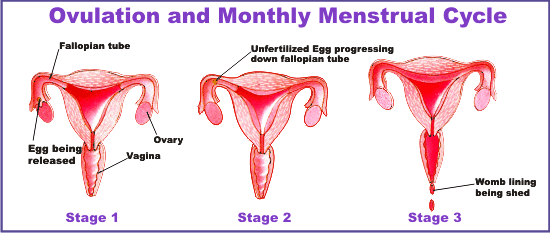Every month, at approximately the same time, you begin to feel extremely bloated and as though the only thing on your face is a bunch of zits. When you think of food, you can only think of consuming chocolate in copious amounts, and the consumption of chocolate is the only item preventing you from hurting that one kid in the back of the math classroom that irritates everyone. Why do women have periods every month?
Why Do Girls Have Periods?

First of all, a woman’s period is preparing her body for pregnancy and is actually the aftermath of ovulation, or the releasing of an egg. This occurs because the pituitary glands release a hormone that tells your ovaries to release an egg. As the egg is being released, the uterus lining thickens in preparation for the egg to implant itself and begin growing. If you have sex before or while the egg is being released, there is a good chance you can get pregnant unless you are using a form of contraception. If the egg is not fertilized, it and the uterus lining break down and flow out through the vagina as blood and tissue, which we call the period.
When Do Girls Get Periods?
On average, girls will start getting their period around ages 12 to 14. However, some women may start as early as 8 or 9, while other women may not start their periods until they are 16 or 17. Every woman is different, so don’t worry if your friends start their periods much earlier than you. Instead, start looking for other body changes that indicate you will start to get your period soon, such as growing breasts and the growth of pubic hair. Once your periods do start, they may be irregular and not come every month, but will eventually regulate to a normal, on average, 28-day cycle.
When your period has not started by 15, or at least 3 years after your breasts started to grow, talk with an adult you trust, such as a parent or doctor, to see if there may be anything you need to do.
Girls Get Periods, What Do Guys Get?
While girls sit and wonder “why do girls get periods,” they soon begin to wonder what the guys have to suffer through. While guys do not start menstruating since they do not have a uterus, they still go through puberty changes, such as a deepening voice, hair growth on their face and pubic area, in addition to other changes.
Other Period Facts You Should Know
Does your period smell or hurt?
Menstrual odor only happens when the menstrual fluid makes contact with air. If you are changing your pad/tampon often enough, there should be no smell. Secondly, the process of menstruating doesn’t hurt, but women’s bodies react differently to the hormones and may experience cramps or other uncomfortable symptoms.
Pregnancy during period is possible.
Most women ovulate several days after their period has ended, but some women have long periods that may coincide with ovulation. For example, someone with a cycle of 24 days may have a full 7 days of bleeding, have sex the last day, and then ovulate within 3 days. Sperm can live up to 5 days and may be waiting to fertilize the egg.
Everyone has their own unique discharge pattern.
In general, women bleed for several days are dry for a few days, and then begin to experience a mucus-like discharge that indicated an impending ovulation that increases in thickness and color, showing that ovulation has ended. Keeping track of your average cycle will help you and your doctor watch for signs of possible pregnancies or other conditions.
Even when you appear regular, you’re not completely regular.
Menstrual cycles can range anywhere from 21 to 35 days, and up to 45 days for teens. Even for women that seem regular, they will still have 1 or 2 irregular cycles each year. When a cycle is shorter or longer, it is not always an indication of pregnancy, but could be caused by other outside influences such as sickness, changes in weight, or stress.
Maintaining proper hygiene is vital.
Most of the media sees menstruating as a 'gross' process, even though it is completely natural and nature’s way of ensuring the survival of the human race. As such, hygiene should took a modest approach in using soaps that are similar to your pH and not too aggressive as over or under-cleansing can lead to vaginitis or infections.
When your mom stopped getting her period affects you.
For most women, menopause (the ending of the menstrual cycle) will occur at the same age as it did in their mother. Research has shown it is actually the most accurate indicator of when it will happen, but anywhere between ages 40 and 56 are normal, with the average occurring at 51.
